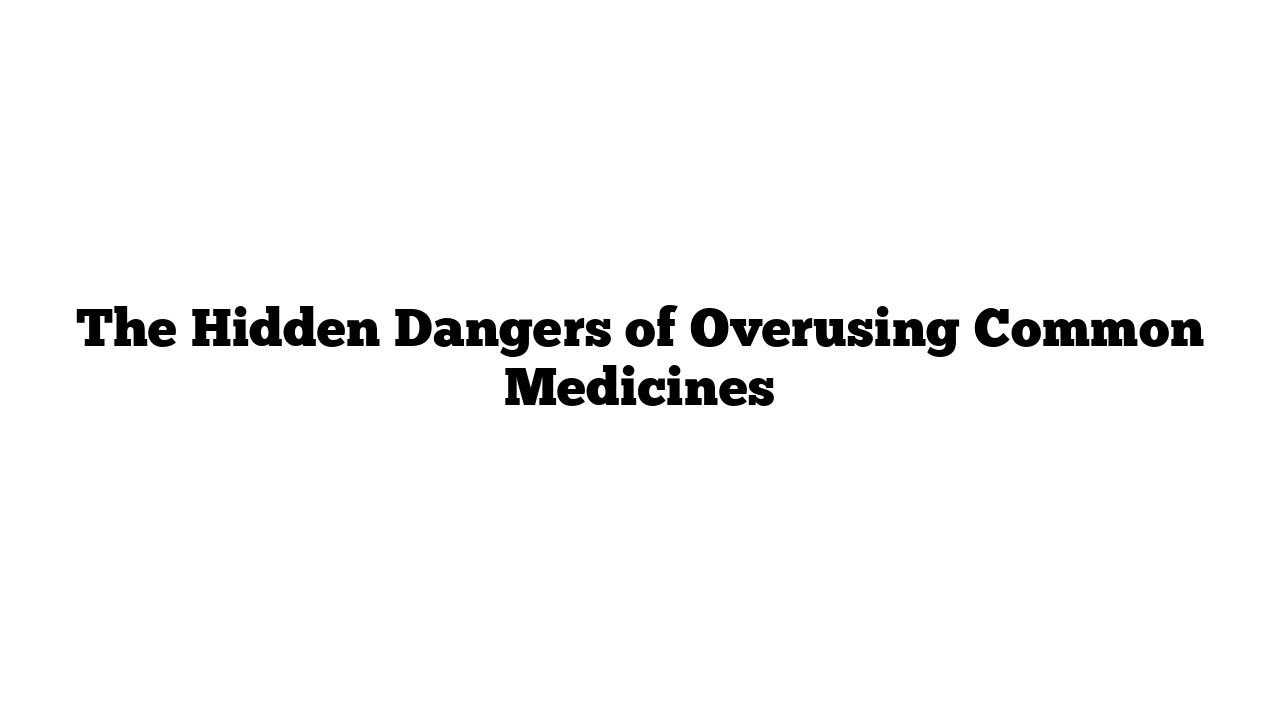Dangers of Overusing Common Medicines: What You Need to Know
While medicines are crucial for managing health conditions, overusing common medications can lead to serious health risks. Whether it’s painkillers, antacids, or over-the-counter cold remedies, improper use can result in unpleasant medical conditions and even long-term damage.
Let’s explore why you should avoid overusing certain medications, the potential risks, and safer alternatives to protect your health.
Understanding Medicine Overuse
What Is Medicine Overuse?
Overuse occurs when people take medications:
- More frequently than recommended.
- In larger doses than prescribed.
- Without a genuine medical need.
This behavior can stem from the misconception that “more is better” or a desire for quick relief. However, excessive use can have unintended consequences.
Examples of Commonly Overused Medicines
- Painkillers (e.g., Ibuprofen, Acetaminophen): Popular for headaches, muscle aches, and fever relief.
- Antacids and Acid Blockers: Used for heartburn or acid reflux.
- Cold and Allergy Medications: Relied on for congestion or allergy symptoms.
Health Risks of Overusing Common Medicines
1. Painkillers: Risks and Consequences
- Liver Damage: Overuse of acetaminophen can severely damage the liver.
- Kidney Problems: Long-term NSAID use (e.g., ibuprofen) may harm kidneys.
- Stomach Issues: Frequent NSAID use can lead to stomach ulcers or bleeding.
“Even over-the-counter painkillers can pose risks if taken improperly,” warns healthcare experts in the USA.
2. Antacids and Acid Blockers
- Calcium Imbalance: Excessive antacid use can cause hypercalcemia (too much calcium in the blood).
- Digestive Issues: Prolonged use of proton pump inhibitors (PPIs) can lead to nutrient deficiencies and increased risk of infections.
- Rebound Acid Reflux: Stopping antacids suddenly after overuse can worsen symptoms.
3. Cold and Allergy Medications
- Dependency Risks: Overusing nasal decongestants like oxymetazoline can cause rebound congestion.
- Heart Concerns: Decongestants may elevate blood pressure or strain the heart when misused.
- Drowsiness: Antihistamines taken in large amounts can impair cognitive functions.
Why Overuse Happens
Common Causes of Overuse
- Lack of Awareness: Many believe over-the-counter medications are harmless.
- Chronic Conditions: Persistent symptoms may lead to habitual use.
- Self-Medication: People often skip consulting doctors and rely on self-diagnosis.
Cultural Factors in the USA
In the USA, convenience and accessibility of medicines contribute to high rates of overuse. With pharmacies readily available, it’s easy to overlook the risks of frequent usage.
How to Avoid Overusing Medicines
1. Follow Dosage Guidelines
- Always adhere to the label instructions or your doctor’s advice.
2. Consult a Healthcare Professional
- Seek guidance if symptoms persist or if you’re unsure about medication usage.
3. Explore Non-Medical Alternatives
- Pain Relief: Try physical therapy, yoga, or meditation.
- Heartburn: Adopt dietary changes to manage acid reflux.
- Cold Symptoms: Use steam inhalation or saline sprays instead of decongestants.
4. Use Apps to Track Medications
- Apps can help monitor doses and prevent accidental overuse.
When Overuse Leads to Dependency
Recognizing Dependency
- Relying on a medication daily.
- Experiencing withdrawal symptoms when stopping.
- Feeling anxious without access to the medicine.
Steps to Overcome Dependency
- Consult Your Doctor: Create a weaning plan under medical supervision.
- Adopt Healthy Habits: Build routines that reduce reliance on medications.
Takeaway: Be Cautious with Medicines
Overusing common medicines may offer temporary relief but can lead to severe consequences. Be informed, consult your doctor, and prioritize long-term health over short-term fixes.
For more insights and health tips, visit medicaltimes.io.
Trusted Resources on Medicine Use
- Mayo Clinic (mayoclinic.org)
- American Medical Association (ama-assn.org)
- Centers for Disease Control and Prevention (CDC) (cdc.gov)
FAQs: Medicine Overuse
1. What does medicine overuse mean?
Taking medications more frequently, in larger doses, or unnecessarily.
2. Can overusing painkillers cause permanent damage?
Yes, it can lead to liver damage, kidney problems, and gastrointestinal issues.
3. Are over-the-counter medications safe to use long-term?
Not always. Long-term use should be guided by a doctor.
4. What are rebound effects from overused medicines?
Symptoms worsening after stopping a medicine, common with nasal sprays or acid blockers.
5. How can I avoid medicine overuse?
Follow dosage guidelines, consult your doctor, and explore alternatives.
6. Are natural remedies better than medicines?
Natural remedies can complement medicines but aren’t always a substitute.
7. Can I stop medications abruptly?
Not all medications should be stopped suddenly; consult a healthcare provider first.
8. How does overuse affect mental health?
Overuse or dependency can lead to anxiety and stress.
9. Is it safe to combine multiple over-the-counter medicines?
Only if they don’t interact negatively; check with a pharmacist or doctor.
10. Where can I learn more about medicine safety?
Visit trusted sites like medicaltimes.io, Mayo Clinic, and the CDC.
